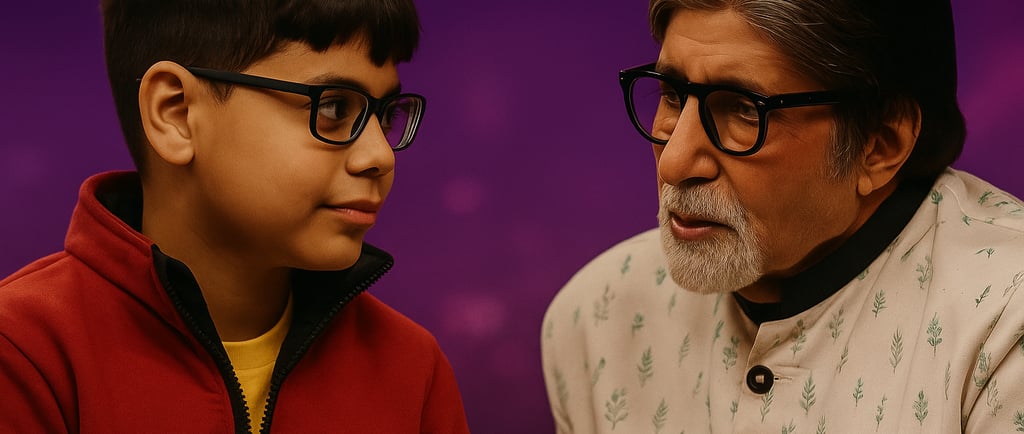Between Confidence and Innocence
The KBC controversy isn’t about one boy’s arrogance — it’s about the world we’ve built for our kids.
Soumia Grace Lobo
10/19/20253 min read


For over two decades, Kaun Banega Crorepati, hosted by the indomitable Amitabh Bachchan, has stood as a celebration of knowledge, composure, and grace under pressure. To sit across from “Big B” is, for many, a moment larger than luck — a quiet honour earned through intellect and poise.
This week, however, a young boy’s brief time on that iconic hot seat became the nation’s talking point — not for the questions he answered, but for how he answered them.
Ten-year-old Ishit Bhatt, a fifth-grader from Gandhinagar, Gujarat, appeared on KBC 17 brimming with confidence. From the outset, his tone was strikingly direct. “Mere ko rules pata hai, isliye aap mereko abhi rules samjhane mat baithna,” he told Bachchan — a line that instantly went viral. Moments later he pressed, “Arre option daalo na,” and when locking in his answer, quipped, “Sir ek kya, usmein chaar lock lagado, lekin lock karo.”
When he incorrectly identified the first kanda of the Valmiki Ramayana, the disappointment on set was brief. What lingered, however, was something far more tender. Ishit wasn’t saddened by the money he lost — what truly broke his heart was learning that he could click a photo with Amitabh Bachchan only if he won ₹12 lakh or more. For a child whose excitement stemmed less from competition and more from meeting his hero, that quiet heartbreak said more than any viral clip ever could.
Online, the reaction was swift and brutal. Clips from the episode flooded social media, and soon Ishit was branded “arrogant,” “rude,” even “entitled.” The memes came fast; the criticism, faster.
But watching the full episode tells a different story — and raises a more unsettling question: isn’t this child, in many ways, a reflection of the world we’ve built for today’s children?
Young people today are raised in an environment where performance is prized above presence. In classrooms and coaching centres, speed is celebrated while hesitation is treated as a flaw. They’re trained to think faster, achieve sooner, and climb higher — often without being taught how to pause. Success becomes synonymous with urgency; self-assuredness is often mistaken for disrespect.
Ishit Bhatt didn’t invent this attitude — he inherited it. His so-called “overconfidence” wasn’t born on the KBC stage; it was shaped in spaces that reward the quickest hand, the fastest answer, the loudest voice. As Bachchan gently remarked, “Kabhi kabhi bachhe overconfidence mein galti kar dete hain.”
If anything, the backlash speaks more about us. Adults, from behind screens, turned a ten-year-old into a national talking point. Celebrities like Varun Chakaravarthy and Chinmayi Sripaada had to remind the public that he is, after all, just a child. The rush to humiliate him mirrored the same impatience and lack of empathy we claimed to find troubling in him.
Perhaps the real lesson here isn’t about a boy’s misplaced confidence at all. It’s about something far more universal — our collective loss of balance, the fragile space between confidence and innocence that we seem to be steadily erasing.
We’ve built a world where achievement is displayed, dissected, and demanded — often before a child even understands what it means to truly grow. Success has become a spectacle. Every score, every performance, every moment of promise is broadcast, shared, and judged in real time. And in this constant chase for perfection, we’ve forgotten that growth was never meant to be public — it was meant to be personal.
When performance begins to matter more than learning, when applause replaces encouragement, and when the photo — or in this case, the viral clip — becomes bigger than the moment itself, we risk teaching our children the wrong lessons. We teach them that mistakes are to be hidden, not learned from. That grace is conditional, that humility is weakness, and that self-worth depends on how loud the world claps.
And so, somewhere between applause and trolling, the gentle art of growing up quietly disappears. The right to stumble without shame, to fail without fear, to find confidence without losing innocence — slips quietly away.
Maybe what Ishit Bhatt reminded us of wasn’t just how children behave under pressure, but how we, as adults, respond to it. His story, beneath all the noise, is a mirror held up to us — asking not whether he was too confident, but whether we’ve forgotten how to be kind.
In teaching our children to win, let’s not forget to teach them how to simply be.
Visual generated using Gemini — capturing the fragile space between confidence and innocence, where a child’s moment under the spotlight became a nation’s mirror.
©2026 NuzRapCo.™ All Rights Reserved. Trademarks under Classes 16, 35, and 41 are protected